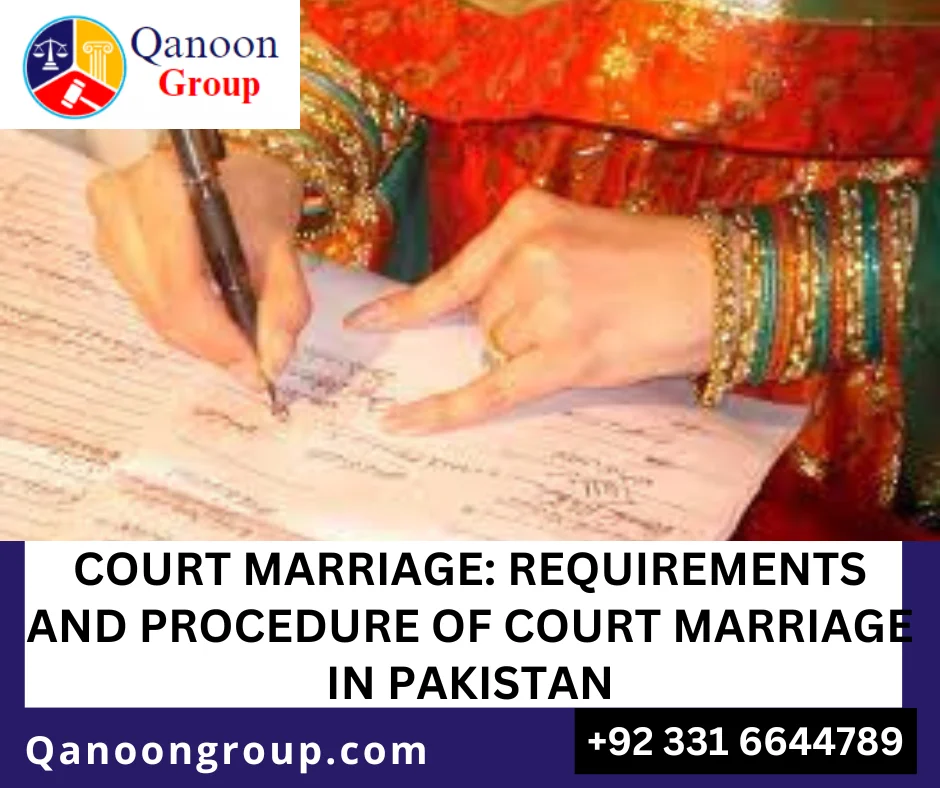Court Marriage in Pakistan – Legal Requirements, Procedure & Key Insights
Court marriage in Pakistan is a legally recognized mechanism for solemnizing and officially registering a nikah under Pakistani family law. Unlike informal or purely religious ceremonies, court marriage ensures a legally enforceable marital status, government verifiability, and statutory protection for both spouses.
This authority page presents a comprehensive explanation of the legal framework, statutory requirements, procedural steps, documentation, common legal questions, and rights associated with court marriage in Pakistan.
What Is Court Marriage? Legal Definition
Court marriage refers to a marriage solemnised and registered under Pakistani law with the free consent of both parties, followed by official registration with the Union Council and NADRA CRMS (Citizen Registration Management System).
Once registered:




Court marriage carries the same validity as traditional ceremonies but has the added benefit of government registration and statutory protection.
Legal Framework Governing Court Marriage in Pakistan
Court marriage is governed by:
Muslim Family Laws Ordinance, 1961
Sindh/Punjab/ICT Marriage Registration Rules
NADRA CRMS Registration System
These statutes ensure uniform registration, legal enforceability, and government record-keeping.
Key Legal Requirements for Court Marriage
1. Minimum Legal Age
Both bride and groom must be 18 years or older.
Any marriage below this age is:



This age rule applies uniformly across all provinces and the Islamabad Capital Territory.
2. Free Consent
Both parties must give free and voluntary consent.
Marriages obtained through coercion or fraud are legally void and can be challenged in civil court.
3. Valid Identification
Original CNICs (Computerized National Identity Cards) of both parties are mandatory. These are verified before registration.
4. Lawful Witness Requirements
A valid court marriage in Pakistan must have two adult Muslim male witnesses at the time of solemnization.
In mixed or non-Muslim cases, statutory witness compliance is determined based on applicable personal law and registration rules.
Court Marriage Procedure – Step by Step
| Step | Description |
|---|---|
| Step 1 | Verification of CNIC and personal data |
| Step 2 | Affidavits of free consent |
| Step 3 | Nikah solemnisation by a licensed Nikah Khawan |
| Step 4 | Issuance of stamped Nikah Nama |
| Step 5 | Union Council marriage registration |
| Step 6 | NADRA CRMS entry & family tree update |
Documents Required for Court Marriage in Pakistan
| Required From Bride | Required From Groom |
|---|---|
| Original CNIC | Original CNIC |
| 6 passport-size photos | 6 passport-size photos |
| Consent affidavits | Consent affidavits |
| Divorce/death certificate (if applicable) | Divorce/death certificate (if applicable) |
Court Marriage vs Traditional (Religious) Nikah
| Aspect | Court Marriage | Traditional Nikah |
|---|---|---|
| Legal Registration |  Yes Yes |  Often no Often no |
| NADRA Family Tree |  Yes Yes |  Often no Often no |
| Civil Assurance |  Yes Yes |  Only religious Only religious |
| Court Defensibility |  Yes Yes |  Limited Limited |
| International Recognition |  Yes Yes |  Varies Varies |
Court marriage combines legal validity with enforceable documentation — making it superior for government records, legal rights and international use.
Legal Rights After Court Marriage
Once a court marriage is registered:




This ensures long-term legal security for both partners.
Common Misconceptions About Court Marriage
Myth: Court Marriage Is Not Legal
Fact: Court marriage is fully legal, recognised nationwide and enforceable.
Myth: No Social Acceptance
Fact: While customs vary, court marriage is widely accepted in urban, professional and overseas communities.
Myth: Complex & Time-Consuming
Fact: With proper documents, the process can often be completed on the same day.
Nation-Wide Validity & Inter-Provincial Registration
Court marriage conducted and registered in one province (e.g., Sindh) is legally valid across all provinces (Punjab, Khyber Pakhtunkhwa, Balochistan) and the Islamabad Capital Territory.
Legal Insights for Overseas Pakistanis
Overseas Pakistanis can:
• Conduct court marriage via video nikah
• Submit embassy-attested documents
• Register through the Union Council liaison
• Update CRMS via NADRA overseas facilitation
All of this provides lawful recognition both locally and internationally.
How to Use This Legal Information
This page is intended to help you:




For transactional assistance — see our linked service pages.
Do You Require More Information on Court Marriage?



These links help you to understand deeply regarding court marriage.
FAQs About Court Marriage in Pakistan
What is the minimum legal age for court marriage in Pakistan?
The minimum legal age for court marriage in Pakistan is 18 years for both the bride and the groom. Any marriage below this age is illegal, cognizable, and not legally registrable.
Is NADRA registration required after a court marriage?
Yes. NADRA registration through the CRMS system is mandatory after a court marriage for legal recognition, family tree update, and official record verification.
Can foreigners marry under the court marriage law in Pakistan?
Yes. Foreign nationals may contract a court marriage in Pakistan, subject to lawful documentation, embassy or consular requirements, and Union Council registration.
How long does a court marriage take in Pakistan?
With complete and correct documentation, a court marriage in Pakistan can often be completed on the same day, including nikah solemnization and registration.
Can a court marriage be conducted anywhere in Pakistan?
Yes. Court marriage may be conducted anywhere in Pakistan, provided all legal requirements are fulfilled, and the marriage is registered with the relevant Union Council.
 Summary
Summary
Court marriage in Pakistan provides a legally enforceable, NADRA-verified marital status. This educational guide explains all legal requirements, procedures, documents, statutes, and FAQs to help you make an informed decision.


